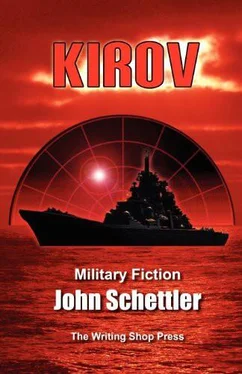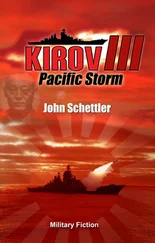John Schettler - Kirov
Здесь есть возможность читать онлайн «John Schettler - Kirov» весь текст электронной книги совершенно бесплатно (целиком полную версию без сокращений). В некоторых случаях можно слушать аудио, скачать через торрент в формате fb2 и присутствует краткое содержание. Жанр: Фантастика и фэнтези, Альтернативная история, на английском языке. Описание произведения, (предисловие) а так же отзывы посетителей доступны на портале библиотеки ЛибКат.
- Название:Kirov
- Автор:
- Жанр:
- Год:неизвестен
- ISBN:нет данных
- Рейтинг книги:5 / 5. Голосов: 1
-
Избранное:Добавить в избранное
- Отзывы:
-
Ваша оценка:
- 100
- 1
- 2
- 3
- 4
- 5
Kirov: краткое содержание, описание и аннотация
Предлагаем к чтению аннотацию, описание, краткое содержание или предисловие (зависит от того, что написал сам автор книги «Kirov»). Если вы не нашли необходимую информацию о книге — напишите в комментариях, мы постараемся отыскать её.
Kirov — читать онлайн бесплатно полную книгу (весь текст) целиком
Ниже представлен текст книги, разбитый по страницам. Система сохранения места последней прочитанной страницы, позволяет с удобством читать онлайн бесплатно книгу «Kirov», без необходимости каждый раз заново искать на чём Вы остановились. Поставьте закладку, и сможете в любой момент перейти на страницу, на которой закончили чтение.
Интервал:
Закладка:
He changed his tone, resigned to the matter and needing to strengthen his men as much as he chastened them. “This attack was repulsed. The weapons selection was correct. The maintenance problem will be rectified. We are all alive and well and the ship is unharmed. Yet I hope this has given us all a hard lesson. Our enemy is determined. Those were brave men out there in those aircraft, and they could scarcely know what was happening to them. Yet they came on through our missiles and died trying to target this ship for destruction. Think of them tonight. Think of the courage it would take to do what you just witnessed. This is our enemy now, and we must match him with equal courage and resolve-equal skill and wisdom.”
“We will, sir,” said Karpov. “I recommend that we come about and engage this enemy surface action group. Let us take out these carriers with a couple of Sunburn IIs and there will be nothing more to expend our SAM batteries on.” He was referring to the lethal, long range anti-ship missiles Kirov carried beneath her forward deck.
“Under the circumstances I do not believe that will be necessary. According to Mister Fedorov, the British carriers had no more than thirty planes each, and we have shot down over forty in the actions fought thus far. Yet we expended thirty-two SA-N-92s, and eight S-300s to do so. I must tell you, gentlemen, that we cannot trade the enemy missile for plane indefinitely. If they persist, and dare to launch another strike at us, then I will consider what you suggest, Captain. Otherwise, as they cannot close on our position further given our speed, I think we can safely proceed south into the Atlantic.”
“But Admiral,” argued Karpov. “They will shadow us. They have just enough planes left to keep long range radar watch on us.”
“For the moment,” said Volsky. “Mister Rodenko assures me that he will have jamming capability for this Type 279 radar by 0800 hours. His technicians are recalibrating the equipment now. Until then, I suggest we all get some rest. I believe you are scheduled for relief, Samsonov. Get some sleep. You have the remainder of the watch, Mister Karpov, but if you are fatigued I can send up Orlov.”
“I am fine, sir.”
“Very well…And one last thing. Good shooting, Mr. Samsonov. You did well, in spite of the missile failure. But have that system thoroughly checked.”
“I will, sir. There will be no more failures.”
“Dismissed. You too, Mister Yazov. You had a sharp eye tonight.”
“Thank you, sir.”
Samsonov smiled, saluted, and left the wardroom with Yazov, leaving Volsky alone with his Captain. The Admiral scratched the back of his neck and then took a sip of cold water.
“As for you, Captain, your decision to engage and your missile selection were correct. The enemy forced us to defend ourselves. But never leave this ship under threat again without sounding general quarters immediately. You owe that much to these men. If that torpedo had detonated…”
“I understand, sir.” There was nothing else Karpov could say.
“We have to be very careful, Karpov; very precise. One mistake, one oversight, one maintenance failure, and we could sustain a damaging hit. To lose eight missiles like that, and to come within inches of taking a torpedo in our gut should be something to keep you awake tonight.”
“It will, sir.”
The Admiral leaned back in his chair, looking at the chart map on the table. “It is going to get worse,” he said quietly. There was no further recrimination in his voice now. He was speaking man to man, and Karpov could hear the shift in his tone, thankful for the measure of respect the Admiral gave him now.
“I will need you, Vladimir. You have a sharp mind, amazing skills, sound tactical judgment.”
“Thank you, sir.”
Volsky pointed to the map. “Yet we must consider strategy as well. Yes, we are a strategic threat, just as you argued earlier. I think we will be here, according to Fedorov, if we maintain this course and speed for another day. That will get us down through this narrow channel. If I know the British, they will have already notified their Home Fleet about us, and we may soon encounter a heavier surface action group intending to intercept us as we exit the Denmark Strait.”
“I agree, sir.”
“We can most likely outrun them. This is our best option.”
“But if we cannot sir?”
Volsky nodded. “Then, Mister Karpov, you will get your chance to fire at a ship worthy of our Sunburn IIs. I would not be too eager to do so, however. We have chastened them, but not really hurt them, and if possible I would like to keep things this way. Consult with Mister Fedorov on the range of the enemy guns. We will see them on radar long before they know where we are, and maneuver to avoid contact wherever possible.”
“Avoid contact? Why should we fear these old ships? We can sink them at our whim, just like we handled these air strikes.”
“For the same reason we should fear those old planes that nearly put a torpedo into us,” said Volsky. “You may think the enemy brings a knife to a gun fight here, but if he gets close, a knife will do!” Our best course is to avoid close contact-use our speed to stay outside the range of their weapons. Their carriers are the only ships that can strike us at range, and I will decide what to do about them.”
“I’ll be looking forward to it, sir.”
“You will? Yes, I suppose you will. But are you also ready for what comes after such an engagement? Thus far we have been sparring with them, nothing more. This business with the air strikes is just the opening round. Sink one of their capital ships, however, and the gloves will come off. They will want vengeance and they will come after us with everything they have. Then our hand is forced to put this ship on a course where the outcome will be far from certain. Keep that in mind, Captain. Keep that in mind.”
Part VII
“As in the mechanism of a clock, so also in the mechanism of military action, the movement once given is just as irrepressible until the final results… Wheels whizz on their axles, cogs catch, fast spinning pulleys whirr…the lever catches, and, obedient to its movement, the wheel creaks, turning, and merges into one movement with the whole, the result and purpose of which are incomprehensible to it.”
— Leo Nikolayevich Tolstoy, War and PeaceChapter 19
August 4, 1941
The PBY was an early bird out of Reykjavik from Squadron 74, a group of six front line planes scheduled to begin operations there in two days. At the request of the British, it was flying a search pattern over the southern exits of the Denmark Strait as the sun came up after barely leaving them for a brief interval of twilight that passed for night in these northern climes. The days were growing shorter, the twilight thickening just a bit each day, but visibility on the whole was very good where daylight was considered. This morning, however, the weather front that had been slowly tracking down from north of Jan Mayen was upon them, and the cloud cover was thicker, with puffy white clouds at altitude and a grey gauze of thinner low haze below.
With Britain still hard-pressed and America out of the war, President Franklin Roosevelt had ordered the occupation of Iceland by United States forces on 16 June 1941. This assignment was given to the first provisional Marine Brigade, a little over 3700 men out of San Diego California. Commanded by Brigadier General John Marston, the force sailed from Charleston South Carolina where it was surprisingly issued heavy woolen underwear. Soon it was joined by Navy Task Force 19 in Newfoundland before proceeding to Iceland.
Читать дальшеИнтервал:
Закладка:
Похожие книги на «Kirov»
Представляем Вашему вниманию похожие книги на «Kirov» списком для выбора. Мы отобрали схожую по названию и смыслу литературу в надежде предоставить читателям больше вариантов отыскать новые, интересные, ещё непрочитанные произведения.
Обсуждение, отзывы о книге «Kirov» и просто собственные мнения читателей. Оставьте ваши комментарии, напишите, что Вы думаете о произведении, его смысле или главных героях. Укажите что конкретно понравилось, а что нет, и почему Вы так считаете.












